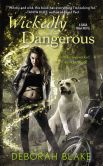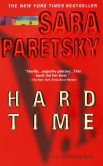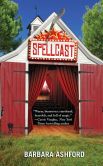 Fairy tales have popped up in my reading in recent weeks several times. I reread a couple of Mercedes Lackey's Elemental Magician series. Read a self-published story using the fairy tale paradigm which sadly didn't reach it's potential. My favorite of the lot was a twist on the Baba Yaga motif of the Russian folklore.
Fairy tales have popped up in my reading in recent weeks several times. I reread a couple of Mercedes Lackey's Elemental Magician series. Read a self-published story using the fairy tale paradigm which sadly didn't reach it's potential. My favorite of the lot was a twist on the Baba Yaga motif of the Russian folklore.Now Baba Yaga of the iron teeth and chicken-footed house was a reading favorite when my kids were young. Deborah Blake's take on Baba Yaga was so interesting, I just had to buy it. The babuska had turned into a hot chick in black leather. [For the record her house was turned into an Airstream trailer, and her traveling companion was a small white dragon disguised as a pit bull.]
Much loved children are disappearing from the town, and Sheriff Liam McClellan is totally frustrated in his search for them when he discovers some tourist's high-tone travel trailer parked on county land. After meeting Barbara Yager, the search for the missing children have to two teaming up to solve the mystery and more. Blake gets the love interest/conflict and mystery set up in the first chapter. The story line roars on as fast as Baba's motorcycle on a chase that involves hydraulic fracking, the Otherworld with an imperious fairy queen, and small town politics until the romantic elements slow the plot down.
Still Wickedly Dangerous was so good, I can't help but wonder why more fantasy writers don't mine folk tale traditions for their fiction.
Rating: 4****. It got a little too mushy towards the end, and the pace of the storyline slowed to accomodate romantic encounters. My feeling? Hey lady, make up your mind, already.
~~#~~
Big Achievement Last Week!
I finished the first draft of The Ghostcrow.
Now a paper copy is sitting on the dining room table with all sorts of pencil additions cluttering up the first third after today's morning writing session. Some
writers would let it sit longer, but I needed to start working on it to present my new ideas to my critique group. Big structural change: I have to go back and add more paranormal aspects. The ghost only has a couple pages, but the story really belongs to Dumdie, the protagonist of The Ghost in the Closet, as she learns to accept her growing abilities to see ghosts.
.jpg) New ideas? Last week I also started a new Cassy Mae [Noticing Jamilla] story. Had her on the bus where she still fleeing The Markham's wrath when a stinky boy plunks down besides her. The story revolves around her accepting her magical abilities and saving the boy from a demon-possessed director of a teen shelter. So, I spent a lot of last week thinking about details of demon possession.
New ideas? Last week I also started a new Cassy Mae [Noticing Jamilla] story. Had her on the bus where she still fleeing The Markham's wrath when a stinky boy plunks down besides her. The story revolves around her accepting her magical abilities and saving the boy from a demon-possessed director of a teen shelter. So, I spent a lot of last week thinking about details of demon possession.Since The Ghostcrow is also set in Andor, I had to transfer the ideas from my doodlings to my edits. The result strengthened the menace of my story's villain.
Only problem I'm puzzling over is timing. The story has a Halloween theme. My critique group didn't meet last summer, so not of the preliminary editing of the story has been done. So I'm left with a story I had planned to self-publish now. The decision I have to make: publish in January to add to my file of Andor stories or submit it for rejection by publications. Problem is it's long. Standing at close to 10,000 words at the moment -- The length I seem to like writing.
Guess I added another reason to my list of why critique groups are important for a writer. They act as a cattle prod to keep you writing. Oh, I was writing ... just nothing new. Revision of a couple novels festering in my computer. I have to partly finished edits on two of them as I try to decide which one I should market. Probably both. Then, I get the great joy of submitting to agents and publishers.
Yeah. Rejections here I come again.
~~#~~
And One Little Milestone:
This is my 350th blog post.
Or, is that a mill stone?

.jpg)



.jpg)


